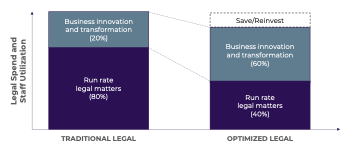With The Conference Board forecasting that the U.S. economy will formally enter a recession in early 2023, many large enterprises are having flashbacks to the past two significant periods of economic turmoil in 2008 and 2018. Likewise, PwC’s 26th annual global CEO survey highlighted the need for businesses to “evolve or die,” per the 4,410 CEO respondents. Seventy-three percent of CEOs believed that global economic growth would decline in 2023. Moreover, nearly 40% did not think their companies would be economically viable a decade from now if they continued their current path.
Behind this sobering economic backdrop are three other prominent trends driving further business complexity:
- Increasing regulations and compliance requirements at the local, state, federal, and international levels
- ESG and DEI concerns from consumers, investors, and boards of directors
- Heightened concerns around cybersecurity and data privacy
For corporate legal leaders, these forces represent two sides of the same coin. On one side, they represent significant run-rate work for already heavily utilized legal teams. But, on the other side, they represent an opportunity for legal leaders to partner with the C-suite and business unit leaders to provide the best possible business guidance on the legal elements of each of these trends.
Corporate legal departments have their own set of challenges. With corporations expecting to do additional work with fewer resources and less budget, so must legal. An E&Y law survey reveals that general counsels expect workloads to increase 25% over the next three years, yet 75% do not expect budgets to keep pace. Per ALM, 2023 rate hikes are 7% to 8% for many corporations, with high-end firms commanding more than a 30% increase.
So, what is the path forward for the corporate legal department? In discussions with Onit customers, we hear that most of their time and expense goes into daily run rate legal matters and activities: contracts, business agreements, I.P. and trademark requests, legal holds management, real estate agreements, and so forth. Unfortunately, this leaves little time for legal to partner with business leaders and provide the guidance the business desperately needs.
Executives now expect legal to operate like other business functions. This includes delivering higher satisfaction amongst internal clients, providing superior legal outcomes (and thus better business outcomes), improving operational efficiency, and demonstrating ROI on spending. To do so, corporate legal departments must optimize legal operations.
They are not alone. Today, many legal departments connect to the business in more influential, material ways – from impacting revenue generation and growth to EBITDA and operational efficiency. While legal operation has existed for decades, the function is at an inflection point. Forward-thinking organizations represent torchbearers for a new chapter in legal operations’ history – an era of optimized legal operations.
Even for departments that have not established a formal legal operations function or team, the operations of legal still happen every day. Nascent legal ops initiatives should adopt a start-up mentality and embrace a modern operating model versus taking a similar adoption path that more mature legal operations functions took.
Legal’s path to making a more material impact on the business requires a focus on driving down the mix of time and money spent on run rate legal matters, so legal teams are freed to focus more on innovation and transformation initiatives.

The Transformation to Optimized Legal
Such a transformation will rely on the usual combination of people, processes, and technology. Corporate legal leaders must now challenge legal operations technology providers to deliver the technology piece of the equation – a modern software platform for managing sophisticated legal matters and contracts with more intelligence, speed, and efficiency. Such a platform needs to provide a digital self-service capability, automate workflows and collaboration, and apply artificial intelligence to bring insights to bear at the point of decision or need.
Why is a platform the linchpin to this transformation? In this next blog, learn how a platform approach starts with a business model, not technology, that can enable Legal to materially impact the business.






